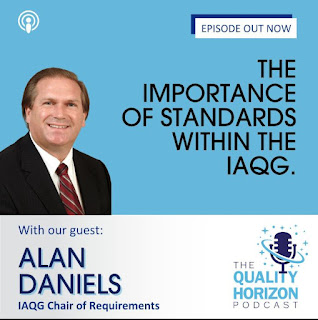Forgive me for interrupting myself. I was going to follow up my last post about customer requirements with one about meeting or exceeding expectations, but that has to wait. Right now there is a contretemps in the ISO 9001 community on LinkedIn, and it relates directly to a point I made in this very blog a few months ago. How can I resist such an opportunity?
It all started when Alan Daniels of Boeing gave an interview in a podcast where he discussed (among other topics) the importance of AS9100. You wouldn't expect this to be controversial. But when the podcast was advertised through a post in LinkedIn, a vigorous discussion broke out in the comments of that post between Christopher Paris, of Oxebridge International, and Doug French, retired from Boeing.Paris asked, If Boeing thinks AS9100 is so important, why don't they hold an AS9100 certification, validated by external auditors?
French replied, We do think the standard is important, and we follow it carefully; but we've made an internal business decision not to spend the money for the certificate at this time.
Paris: Why should I believe you, if you don't back up your words with an objective certificate?
French: What part of the words "internal business decision" do you not understand?
And it kind of went downhill from there.
What delights and fascinates me about this discussion is how exactly it echoes points that I've discussed in this blog. For example, Paris's objection that there is no reason to believe Boeing follows the rules of AS9100 without a certificate could have been copied verbatim from the last paragraph of my post two weeks ago about why we have standards in the first place. [Note: because Boeing is in aerospace, the discussion between Paris and French revolves around AS9100. My post is about ISO 9001. But the issues involved are identical.]
But what really caught my attention is that Boeing seems to be following the very advice I posted last March, in this post here, about whether or when to seek certification. If you remember, what I said was this:
"[W]hile every company benefits from doing things well, not every company benefits from having a certificate to hang on the wall attesting that they do things well. If having this certificate will bring you more new business than it costs you to get it ... then it is worth the money to get the certificate. If not, not."That's exactly what Doug French said.
How does this advice apply to Boeing? Companies often seek certification for a couple of reasons. One is that a customer demands it; another is that it sets them apart from the competition. But who exactly is Boeing's competition? There are only two major airplane manufacturing companies in the world that sell commercial jetliners: Boeing and Airbus. [Reference.] Yes, of course there are smaller manufacturers as well, but for all practical purposes no other company can compete with these two. So Boeing has no need to set themselves apart from competitors by seeking certification. And there are no customers demanding to see a certificate, because the relevant customers know that they don't have a wide choice of vendors. There is simply no compelling economic reason for Boeing to seek certification.
To be fair, Paris recognizes this. While he chastises Boeing for not seeking certification, the reason he offers is not economic. His reason is moral: noblesse oblige. While recognizing that of course Boeing can get along just fine economically without certification—business has gone swimmingly up till now, after all—he argues that if Boeing is going to champion the AS9100 standard (which they do), and if Boeing is going to require all their suppliers to be certified to AS9100 (which they do), then they should feel morally obligated to lead by example. So long as they don't, Paris argues, their protestations about the importance of standards and certification sound hollow.
Is he right? I guess it's a matter of opinion. But the way the airplane manufacturing business looks today, Boeing is probably safe in doing what they do. Even if a lot of people end up agreeing with Paris, how far will that cut into their sales? I predict that the effect will be negligible compared to the ups and downs of the worldwide demand for aircraft—and I'm certain Boeing is paying a lot of attention to that.
And if things change one day? If suddenly there is a material risk that Boeing will be penalized in the marketplace for not holding a third-party certificate of compliance to AS9100? The day that happens, Boeing will contract with a Certification Body and get their certification. That's what any company would do. If having this certificate will bring you more new business than it costs you to get it ... then it is worth the money to get the certificate.
I'm still tickled to think that Boeing is following my advice on this point.






No comments:
Post a Comment